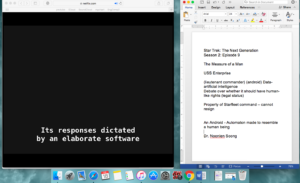Digital Receipt 4
 Texting has def ruined my writing skillzzzzz…
Texting has def ruined my writing skillzzzzz…

Tuesdays 5:00-6:15pm | North Academic Center Library 1/301Y [email protected] | (646) 801-1462
 Texting has def ruined my writing skillzzzzz…
Texting has def ruined my writing skillzzzzz…
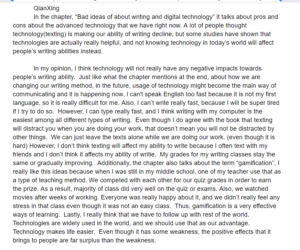 my opinions towards the reading.
my opinions towards the reading.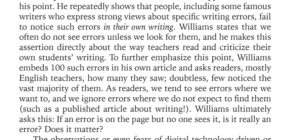 Grammar mistakes are really hard to find unless you plan to find it.
Grammar mistakes are really hard to find unless you plan to find it.
 Rules of grammar.
Rules of grammar.
![]() “methods of communication are changing,”
“methods of communication are changing,”
Hey all-
Some of you may have noticed that your images are not posting correctly to the course site.
You may be seeing an error message about “Alt Text.”
What the heck is this?
Alt Text is the the text that a screen reader will speak when it encounters an image on a website. Screen reader software is often used for folks with low vision and/or blindness, migraines, or other disabilities that make it difficult to read from a computer. It is very important that you get into the habit of including alt text in your uploads. Alt text may also be called “image description” with some software.
Sample alt text:
“Meme of several long-haired people holding their cell phones and smiling below large text that reads “sorry I’m super busy dissociating into my phone” by @femme4memes”
Algorithms of Oppression by Safiya Noble is about how algorithms and technology have promoted racism and sexism. The author talked about the problem with Google’s search engine in order to support her argument. I found this book excerpt to be really interesting because I never really considered Google’s search engine to be racist or problematic. One example that showed the problem with Google’s algorithms was that African Americans were being tagged as apes or animals. Another example was that when searching the word N*gger on google maps, the result would be the white house. Another problem the author discussed was whether the information on Google is real. A lot of times when using searching up something on google, a paid advertisement would be the number one result. I agree that this a problem because most people would click on the first link believing it is the most popular and trusted but actually it is a paid ad.
I wanted to learn more about Google’s search engine by watching a video on youtube of Google’s CEO Sundar Pichai responding to Congress. One congresswoman asked the question as to why when searching up the word idiot under images, a picture of Donald Trump comes up. Pichai said that the search engine matches the key world with millions of online pages. Google determines what pictures are the best match for the keyword based on relevancy, popularity and how other online users are using the word. Pichai also says that there is no one manually choosing pictures to match with keywords. I believe the problem is not only Google’s algorithms but people who use the internet. Google handles about 3.5 billion searches in a single day so it would be difficult to monitor racist or sexist search results. It would also be hard to program the search engine to differentiate what is racist and what is not since it is not human.
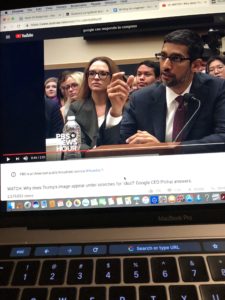

Star Trek: The Next Generation’s episode “The Measure of a Man,” is based around an argument whether an artificial intelligence deserves human-like rights. Lieutenant Commander Data is an android, which is defined as an automaton made to resemble a human being, made by Dr. Noonien Soong. Commander Bruce Maddox has come to take Data, so he can use him as research on how to create another being like him. Since there is only one of his kind, Commander Bruce would need to take Data apart and risk him not being able to put him back together successfully. Under Captain Picard’s advice, Data decides to resign so he would not be submitted to the procedure. This is when there is a debate whether Data is the property of Starfleet command, therefore does not have the right to resign. Opposing the ruling, Captain Picard requests a hearing where Commander Bruce Maddox regards Data as non-sentient. When asked how to define someone as sentient, he says they must possess three qualities; intelligence, self-awareness, and consciousness. Commander Bruce argues that there is no way to prove that Data does not have even the smallest amounts of all three qualities. The Starfleet court ultimately rules that Data has the right to choose. This case is one difficult to choose opinions on, as artificial intelligence are generally created for their intelligence, not to mimic humans. But, an android specifically is made in the image of a human, and as they procure human-like emotions it can be understood the desire for their rights.
Algorithms of Oppression by Safiya Noble is an eye-opening composition as it sheds light on a topic many people are ignorant to. The basis of the book is surrounding the racial discrimination against people of color, in particular women in technology. Safiya explains how Google’s search engines are prime examples of this racism and sexism. Google has unnoticeably used their search engines to form our minds and lives by making us associate particular words with negative racist and/or sexist connotations. They, in turn, have been biased to the white community, giving them privilege by always portraying them in “perfect” light.
In the text ‘Algorithms of Expressions’ by Safiya Noble, Noble analyzes on the schematics of algorithms and how its values shape the social reformations involving racial profiling. At first, Noble describes the schematics by introducing the concept of how algorithms exhibit a sense of visibility which is then perceived by the society in a decision-making way. Noble gave examples of those who were involved in the “decision making” by describing various professions such as bankers and real estate agents and how they manufacture inequalities in these fields. Noble gave an example by stating- “people of color are more likely to pay higher interest rates or premium just because they’re black or Latino” ( Safiya 1). This statement shows how the mobilization algorithms rather demarcate the border of inequality rather than allowing everyone, no matter their creed or race to flourish with their profound knowledge. Noble continues her argument by stating that even on the internet, racial discrimination is evident through coding in technology. Personally, this hit me since it’s honestly crazy how people are finding ways to converse these unethical statements and put it out as an anonymous user. As technology seems to advance, the creation of artificial intelligence will also grasp onto these statements. As Noble describes the work field later, another aspect that stood out to me was Google’s wage gap between men and women. Now, prior to reading Noble’s text, I knew wage gaps existed, but I didn’t know that a multibillion-dollar company really discriminates its workers based on gender. As google advances their technological field, its honestly shocking that google workers are supporting the insane claims made by James Damore of how women are inexperienced and inferior in terms of software programming. Using search engines to promote racial slurs is honestly disgusting and should be stopped right away
Jaspreet Jaswal
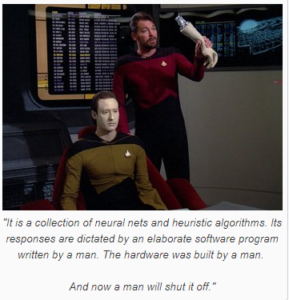
Hurtful Arguments
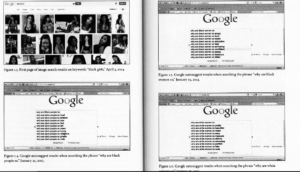
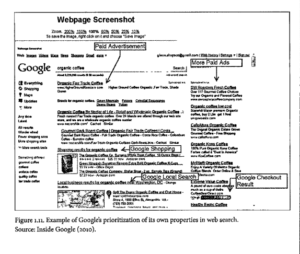
Conversations about ethics and racism, A.I. and algorithmic ideologies
As stated by great Martin Luther King, Jr “The ultimate measure of a man is not where he stands in moments of comfort and convenience, but where he stands at times of challenge and controversy”, I kind of related to this awesome episode of TNG’s ‘The Measure of a Man’. The way Data initially reacts to being told he has no rights. He takes what would for any man be a reason for outrage and instead approaches the situation purely with logic. He has strong opinions on the matter, but he doesn’t get upset, because that’s outside the scope of his ability to react. His reaction is based solely on the logical argument for his self-protection and his uniqueness. And at the end, after he has won, he holds no ill will toward Maddox. Indeed, he can sort of see where Maddox is coming from. Overall, I agree with the fact that all beings are created but that does not necessarily make them the property of their creator and since no one is owned, everyone has the right to make their own decisions regarding their life.
Safiya Umoja Noble’s ‘Algorithms of Oppression’ is interested in the consequences of the cultural transition of digital technology from visionary to the framework of everyday life. Although Noble focuses mostly on Google and its parent company, Alphabet, her argument applies literally to Amazon, Facebook, Twitter, and WordPress. Noble explains how Google replicates the harsh material history against black women through the mechanisms that operate its search engines and advertising policies. Although her primary focus is on the relationships between Google and black American women, her argument always has an eye on other historical forms of oppression. It may be that the monopoly of Google and similar infotech corporations have grown large enough to creep into all public life or it may be that the racial, gendered, sexual, and classed social life have traditionally targeted black women in America so particularly that there are very few oppressive tactics that have not been applied to black women at some point or another. In any case, Noble always has an eye on a wider public while she attends to the historical differences of American black communities.
References:
